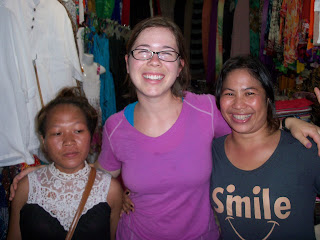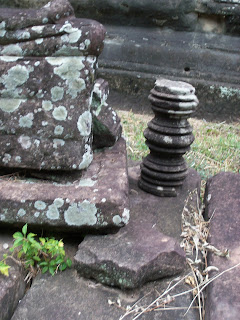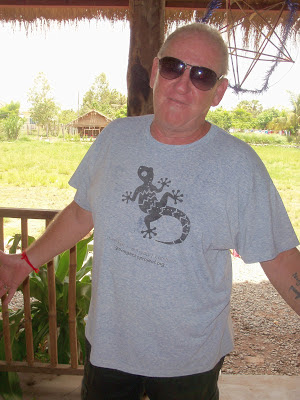I haven't had access to internet for a while... From May 11:
After two
grueling plane rides of fourteen and five hours each, we landed in the Pearl of
Asia - Phnom Penh, Cambodia's capital. As I entered the loading bridge, I was hit
with a wave of tangible humidity. Half a world away from Charleston, the
weather here is more comparable to home than Roanoke. In two days, we visited all
of the key tourist sights. At Wat Phnom, a Buddhist shrine atop a man-made
mound twenty-seven meters above the city streets, we awkwardly flashed our
cameras amidst the chorus of xylophones resonating through the temple.
Worshipers burned suffocating quantities of incense and fervently proffered
themselves before the golden Buddha, praying for luck and blessings.
 |
| Wat Phnom |
Over and over, we
pulled our cameras out of our packs and flashed away... at the Royal Palace and
the Silver Pagoda, in the National Museum of Cambodian artifacts, in the Tuol
Sleng prison and the Killing Fields, both of which are reminders of the
atrocious Khmer Rouge regime. The food here is amazing, and pictures have definitely
been taken of each lunch dish, beginning with our first course of fresh, savory
vegetables sautéed in lemon and olive oil to our dessert of deep fried chocolate
and banana spring rolls. (And classmates speak of losing weight over here.
Right.)
 |
| Buddha Buddha Buddha Buddha rockin' everywhere |
 |
Royal Palace
|
I want to
remember everything and share it with you, so the pictures will continue, but I
wish I didn't feel so touristy. The fact of the matter is, right now, that is
what we are. In three days, I have never been so aware of my wealth. As we
enter each “must see” location, there is a persistent group of aged amputees
and half-naked children holding out their hand. “One dollar?” they beg. “Yes
please?” My eyes shift downward and I pass by, trying to subdue my guilt.
Mere decades ago,
the Khmer Rouge Regime decimated Phnom Penh. Today, the corruption of the Cambodian
People’s Party, composed of select dictators who make up this so-called
government, though less blatant, is not much improved. You have to be blind to
miss the poverty, the prostitution, the pain…it’s rampant.
An estimated two
million innocent natives were murdered during the Khmer Rouge regime. Many
suspected traitors were first sent to a torture chamber, like the Toul Sleng S-21
prison we visited two days ago. Of the 17,000 victims who entered, only seven
survived. They endured terrible torture - salt water doused on fresh wounds,
pulled fingernails, ripped testicles, and electrocution. The mangled bodies do
not look human. Reminiscent of the Holocaust, rows of pictures line the museum.
Each person portrays a different emotion, seen in the direction of their brow,
the whites of their eyes, the tension in their jaw. Some angry, others tired,
many terrified, a handful peaceful. None smile. Even the babies, 2,000 of them,
were killed, because “you can’t just cut the grass; you have to pull the roots
out, too.”
 |
| Torture Room of S-21 Prison |
Most of these
victims were buried in one of the hundreds of killing fields located throughout
Cambodia. With its dozens of large, gradually sloping holes outlined by a maze
of walking paths, the one just outside of Phnom Penh resembles an unkempt golf
course or a grade A beginner’s dirt bike trail. Think again. Each of these
holes is a mass grave, and some hold the remains of several hundred people. In
one, all of the bodies were decapitated. As I passed, I heard a tour guide
explain this was because they had the body of a Cambodian and the head of a
Vietnamese. In the center of the killing field, a towering glass stupa displays
hundreds of skulls. The skeletal remains from the Khmer Rouge reign testify to
the power of the government, and in my few days here as a tourist, I see it
playing out.
 |
| Soldiers used the serrated edge of this type of palm plant to slit people's throats at the Killing Fields. (!) |
When my sister
was four, Pink Baby, her life-sized doll, was always in tow. A piece of plastic
never received so much attention. That’s the thing, though. Pink Baby was
plastic, indestructible. When she was dropped, which, though loved, happened often, Pink Baby suffered no brain damage.
Yesterday I witnessed a little girl loosely holding a scrawny, naked baby – a real one, mind you – in her arms, its
head unsupported, hanging at least fifty degrees past the crook of her elbow.
Only a few years older than the malnourished infant herself, she carelessly
lost hold of his waist. I stared, shocked, as his soft skill inevitably hit the
dirt. In a three-second wayward glance out the tour bus window, a variety of
scenes are witnessed.
Later that day at
the central market, I quickly emptied my money belt of all of the cash I had
with me bargaining for a few gifts. On my last purchase, I even had to borrow
an extra two dollars from Courtney. Afterwards, the whole group ventured over
to a sidewalk technology kiosk where they sell cheap electronics the same way a
New Yorker sells hotdogs. It began raining, an unexpected gift on a typically
hot afternoon. As I inched backward for cover under the overhang, I bumped into
a short, emaciated woman holding out her hands, rambling on in Khmer. Her grin
revealed a few crooked, decaying teeth. I know the Lonely Planet travel guide
advises me not to give money to the beggars or the children, but how am I to
ignore the harmless woman half a foot away from me? After being refused by many
in the group, she and her friend continued to stand uncomfortably close to us, motioning
her wrinkled hands up to her mouth.
“I don’t have any
money,” I confessed, shaking my head and opening my empty hands.
Oh God. This
is the worst. I really did not have any money with me. They laughed and kept on
foolishly smiling. They think I’m lying.
They think I've got a few extra bills I could so easily throw their way, that
I’m being a selfish white woman. I would have given it to them.
The next day, I
did stick a dollar each through a chain-length fence to two small boys. I know
you can’t give to everyone; you wouldn't be able to pay for your hotel at the
end of the day. But I have so much, and even if they are getting money from all
of the other soft-hearted tourists, I will be richer than them for the rest of
my life. If I have a $20,000 salary someday, I will still be better off. It’s a
dollar, and I will never miss it.
I think I’ll
continue to struggle with my infinite wealth in places of poverty; when we go
to the countryside, I’ve heard it gets even worse. Still, I don’t see an
utterly despondent Phnom Penh. Walking around the city and flashing my camera, I
capture glimmers of promise. Even with the prostitution and the genocide and
the poor kids out of school, these people are some of the happiest I have met.
As a whole population, their pain has brought resilience. They are polite and
positive, and the natural environment, from the banyan tree to the water
buffalo, exudes peace and healing.
We, the moneybag
tourists with our swanky digital cameras, malaria pills, and dorky money belts,
can’t change everything, but we can choose how
to tour. We have a lot to learn from the Cambodians, and we can help
improve their standard of living. Organizations like Friends International and
Daughters of Cambodia have established restaurants and gift shops whose profits
directly support the education of street kids and prostitutes. After their
training, many go on to work in other hotels and restaurants in Phnom Penh.
The
delectable and authentic food is more expensive, but it’s still reasonable and
so worth it. A child safe network of hotels and businesses in the area has been
established who do not tolerate sex tourism. When everything is so cheap, we
can afford to support these restaurants and hotels with our business. I found a
corner of graffiti in the S-21 prison – “peace,” “never again,” “always
remember.” It was encouraging. Likewise, the air of solemnity surrounding the
killing fields is tangible, but visitors had placed hundreds of multi-colored
string-woven bracelets hung over the bamboo fences around the graves. Do not forget us, they seemed to say, but you can overcome; there is hope.
I may be a
tourist, but this country is giving me hope. Perhaps I am giving it a little
bit too.














































